- Browse Repository
- College of Arts & Sciences
- CWRU Dittrick Medical History Center
- 1867-03-30 (x)
- Robert M. Stecher Collection of Darwiniana
Robert M. Stecher Collection of Darwiniana
The Robert M. Stecher Collection of Charles Darwin Books and Manuscripts
The Robert M. Stecher Collection of Charles Darwin
Show moreEnvelope dated April 24, 1882, addressed to the Rev. J. Brodie Innes, 2 Addison Grove, Bedford Park
The Robert M. Stecher Collection of Charles Darwin Books and Manuscripts
Show less
Show moreEnvelope dated January 2, 1879, addressed to Milton Brodie, Forres, Scotland Transcription: "J.L. Brodie Innes. Milton Brodie Torres [] Scotland Dear Stanley."
The Robert M. Stecher Collection of Charles Darwin Books and Manuscripts
Show less
Show moreFoolscap sheet, botanical notes, written by Charles Darwin Transcription: "The following members refer to Watsons "Aliens," or plants "how more or less established but either presumed or certainly known to have been originally introduced." [N.B The "Colonists" or weeds for cultivated ground are not here included.] Aliens. The denominator whos total number of "Aliens" in Gt. Britain. The numerator the number of cruciform Aliens. In Gt. Britain, excluding "Aliens" Cruciform 12/92 = 1/7.6 55/1238 = 1/22 Legurinosa 5/92 = 1/18.4 61/1238 = 1/20 Umbollifera 4/92 = 1/23 54/1238 = 1/22 Compurita 10/92 = 1/9.2 117/1238 = 1/10 Laninea 5/92 = 1/18.4 102/1238 = 1/12 [] 3/92 = 1/30 51/1238 = 1/24 Lamiacea 3/92 = 1/30 43/1239 = 1/28"
The Robert M. Stecher Collection of Charles Darwin Books and Manuscripts
Show less
The Robert M. Stecher Collection of Charles Darwin Books and Manuscripts
The Robert M. Stecher Collection of Charles Darwin Books and Manuscripts
The Robert M. Stecher Collection of Charles Darwin
Show moreIllustration from Merchants' Gargling oil liniment. Text underneath advertisement refers to Darwin.
The Robert M. Stecher Collection of Charles Darwin Books and Manuscripts
Show less
The Robert M. Stecher Collection of Charles Darwin Books and Manuscripts
Show moreLetter to Grant Allen asking if there is any room in the theory of evolution for "designing mind... behind the first steps..." Transcription: "[filter] of Temperance Movement from Albert Wilberforce The Deanery, Southampton Aug 16 (1881), 20 [Dennis yard?] Mr Allen [] During my long spell of illness I have read among other things your quite delightful volume of articles under the title of "[The] Evolutionary at large" I have no [filter] to learn your writs a question + shall not be surprised if you are too busy to reply to me but it would interest me to know whether in your work of proving that the beauty order + [] of nature are due to other [] interaction of a vast number of natural laws and not to any distinct aesthetic intention on the part of nature you mean to exclude any aesthetic intention on the part of some initiating mind behind Nature. I have considered [] evolution if satisfactory, proved [] added to [] [] [] the [] are a majority of the [] [] that never have been [] the first steps and [] [] make out whether your conclusions leave room for the designer in other words where the [] excludes the idea of god, how does he get on [] [] With many apologies for my intrusion I am faithfully yours Albert Wilberforce" Letter, signed by sender. Sent from The Deanery, Southampton.
The Robert M. Stecher Collection of Charles Darwin Books and Manuscripts
Show less
Show moreLetter to Grant Allen to say how much Wallace enjoyed Allen's article "Natural inequality", an article in defense of socialism. Transcription: "Parkstone, Dorset April 21, 1897 My dear Grant Allen I must send you a line to say how much I have enjoyed your "Natural Inequality". It is a most admirable answer to one of the commonest but most stupid objections to Socialism. I only wish it were published in some colume or periodical more likely to be read by our opponents. With very best wishes Believe me yours very sincerely Alfred R. Wallace" Letter, signed by sender. Sent from Parkstone, Dorest.
The Robert M. Stecher Collection of Charles Darwin Books and Manuscripts
Show less
Show moreWallace writes to Allen on the subject of color perception of animals, including man. Significance of colored flowers and fruits interested Wallace especially. He also discusses Gladstone's paper on Homer's color terms in the letter. Transcription: "Rosehill,[Dorking]? Oct 7th. 1877 My dear Sir I have read the passages you marked, as well as a good many other parts of your book with much pleasure. I was particularly pleased with your suggestion (which had not occurred to me) that fruits, in our sense of the word, are more recent tdevelopments than flowers because they attract chiefly mammals + birds instead of insects. There is I admit a partial contradiction between the view that red excites animals on account of its glaring contrast, + that yet the perception of it by man is recent. The latter view [] I believe be incorrect, + should be stated I think more hypothetically that I have put it. I have just been reading Mr. Gladstone's interesting paper which is almost wholly on flowers' colour terms or rather the absence of them. The evidence is most curious, but I think it only goes to show that language was imperfect, and that colour was too infinitely [] + of too little importance to early man, to have received a systematic nomenclature. Flowers + birds + insects were despised, + the colours of more important objects as the sea [] earth, iron, brass etc. were not only not pure colours (generally) but subject to endless fluctuations. Your remarks on nuts are very good. I quite overlooked that case + shall refer to you when I [] my papers with there is a volume shortly. I think all the coloured fruits which are poisonous to man are eatable to some birds etc. They are far too numerous to be accounted for otherwise. With many thanks Believe me yours faithfully Alfred R. Wallace Grant Allen Esq." Letter, signed by sender. Written from Rosehill, Dorking.
The Robert M. Stecher Collection of Charles Darwin Books and Manuscripts
Show less
Show moreLetter to Grant Allen for his kind words about Wallace's "Darwinism". Also, he discusses reasons for his rejections of "sexual selection". Transcription: "Parkstone, Dorset. July 22nd. 1889 My dear [Grant] Allen I must write a line to thank you for your kind + far too flattering [] of my "Darwinism." - I feel that your offering sentience is not correct, + that I have received full recognition - even more than full - for all the little I have done in natural history. I accept however with the satisfaction your recognition of my work for "Land Nationalisation" since I myself consider that by for the more important of the two. I am pleased, too, with your recognition of the twofold objects of my book + I am glad to find that you think I have succeeded in both objects. With your remarks in the 3rd Col. if you [] of course I do not agree. You are right in your [] that my spiritualism led me to my views as to man, but I deny altogether that this is an a priori view, since the facts of spiritualism are to me just as real and certain as the facts of organic nature, and I am bound to bring the two into harmony. But you are wrong again as to this view having had any influence in my rejection of -natural- sexual selection. That arose solely from the absence of evidence for it, and the to me enormously improbable assumption that the making of butterflies depends as the choice of the female + that that choice is determined by [] differences of [] I think you are quite wrong as to the importance of [Weissmaus'] theory + the amount of evidence in its favour. I admit that it is not yet established, but I feel almost sure it will be. If the inheritance of all acquired characters + modifications were a law of nature I see no reason for the origin of sex. A short time since I had a delightful + very kind + flattering letter from your father with whom I spent some very enjoyable days, and I have seldom met two more charming people that Mr + Mrs Allen of [Alurington?]. We have removed here from [Godalung?] to get a milder climate + more sun. Should you ever be at Bournemouth (close by) come + see us. Yours very sincerely Alfred R. Wallace P.S. I have just read "Looking Backward" and it has convinced me of the practicability and desirability of Socialism. It is a work of true genius." Letter, signed by sender. Sent from Parkstone, Dorest.
The Robert M. Stecher Collection of Charles Darwin Books and Manuscripts
Show less
Show moreLetter to [Grant Allen] on color perception of animals including man. Significance of colored flowers and fruits. Also discusses Gladstone's paper on Homer's color terms. Transcription: "Rosehill, Dorking Oct. 7th 1877 My dear Sir I have read the passages you marked, as well as a good many other parts of your book with much pleasure. I was particularly pleased with your suggestion (which had not occurred to me) that fruits, in our sense of the word, are more research developments than flowers because they attract chiefls mammals + birds instead of insects. There is I admit a partial contradiction between the view that red excites animals on account of its glaring contrast, + that yet the perception of it by man is recent. The latter view must I believe be incorrect, + should be stated I think even more hypothetically that I have [] it. I have just been reading Mr. Gladstone's interesting paper which is almost wholly on flowers' colour terms or rather the absence of them. The evidence is most curious, but I think it only goes to show that language was imperfect, and that colour was too infinitely [] + of too little importance to early man, to have received a systematic nomenclature. Flowers + birds + insects were despised, + the colours of more important objects as the sea [] earth, [], [] etc. were not only not pure colours (generally) but subject to endless fluctuations. Your remarkson insects are very good. I quite overlooked that case + shall refer to you when I reprint my papers with others in a volume shortly. I think all the coloured fruits which are poisonous to man are eatable to some birds etc. They are far too numerous to be accounted for otherwise. With many thanks Believe me yours faithfully Alfred R. Wallace Grant Allen Esq." Letter, signed by sender. Sent from Rosehill, Dorking.
The Robert M. Stecher Collection of Charles Darwin Books and Manuscripts
Show less
Show moreWallace writes to Allen about the color vision theory that was put forth in Allen's recent book ('The colour-sense: its origin and development; an essay in comparitive psychology', London 1879), which Wallace has just read. Transcription: "Waldron Sage, Duppas Hill, [Grogdan?] Feb. 17th. 1879 Dear Sir Very many thanks for your book on "The Colour []". I have just finished reading it through + I have seldom read a book with more pleasure. It is full of original and suggestive matter, and is admirable in its clearness and the thorough manner in which many aspects of the subjects are discussed. Of course I totally dissent from your adoption of "sexual selection" as a vera causa though of course you are quite justified in following Darwin rather than we as an authority. I think you [] many parts of your argument especially the connection of bright colours in animals with the colours of the food. I also think you lay far too great stress on our knowledge of the first appearance of certain groups of plants + insects, but I shall probably deal with these questions in a [] I may write of your book. I must say I do not see the least force in what you say on the probably identity of colour sense in ourselves + which. For it is clear that the optical [] of these two, have been developed separately, and if the causations were alike it would be a coincidence which we have no reason to expect. The fact that insects differentiate most of the contrasted colours, by us means [] a [] afford any probability, that their causations are any thing like ours, and I still maintain that the probability is they are unlike. With birds + ourselves, on the contrary, we may be almost sure the causations are similar, because our eyes + nervous systems are derived probably from a common ancestor who had both well fairly developed. A day or two ago I received from a gentleman reading in Germany a very clever article on the "Origins of the Colour Sense", in which he shows physiological grounds for the belief in the great inferiority of the colour sense in all mammals, + the inferiority even of ourshelves + birds. I am trying to get it publised w/ one of the Reviews. I am very sorry you did not put a good index to your book. It is most difficult to find any special point you want + causes endless trouble. I feel so strongly on this that I think the publication of indexless books should be felony without benefit of []! I will not wish your book success, for it is sure to be successful, as it well deserves to be. Believe me. yours very faithfully Alfred R. Wallace. Grant Allen Esq. P.S. In my original paper in [Macmillains Mags??] I spoke doubtfully about the [] work of colour sense because the subject came upon me suddenly just as I had finished my paper. I still think however that colour blindness is an indication of imperfection, + I hope evidence will soon be obtained as to its equal prevalence or absence in some civilized rave. I doubt its being a product of civilization, since civilized man makes more uses of colour than savage man. It is an interesting and important question. A.R.W." Letter, signed by sender. Written from Waldron Edge, Duppus Hill, Croydan.
The Robert M. Stecher Collection of Charles Darwin Books and Manuscripts
Show less
Show moreWallace encourages Allen to write a novel with an "enthusiastic socialist" as the hero, after reading Allen's "At market value". Wallace continues to say that he is simulated by reading Craig's "Ralahine", and adds that it is "perhaps the most interesting and successful experiment in cooperation and socialism ever tried". Transcription: "Parkstone, Dorset April 4th 1899 My dear Grant Allen When I read Mrs. H.Ward's "Marcella", a few years back, + I saw how thoroughly she had got up the arguments of the Socialists + how in all discussions she made Marcella have the best of it, I said to myself, how at last we shall have a Socialist in a Novel who does something worthy, + does not turn out a fool or a []! But alas! When the opportunity came, Marcella did no more than apply the usual plaisters + palli"atives" of the parliamentary philistine. Now, I have been reading your "At market Value" - which I enjoyed very much as a story, and also admired the character of the self-sacrificing hero - who I am glad to see you made to recognize that he had not acted heroically at all, but had wickedly thrown away a great opportunity of doing good by his self-sacrifice. Now why did you (who know so much better) follow the weak example of Mrs. H. Ward? Is it impossible that a sensible socialist should inherit wealth, and do something with it worthy of his creed? Surely it would not be difficult to make his struggles + trouble and efforts to do good both successful + interesting. I have been led to write this by reading Craig's "Ralahime" - perhaps the most interesting + successful experiment in Cooperation + Socialism ever tried, but narrated in such a confused and discursive way as to be puzzling to most readers. Now why do not you write a novel of an enthusiastic Socialist - the outcast of his family - who yet inherits a great lauded estate - + uses it to teach cooperation, land- nationalisation + socialism? He might try many methods. Lord Carrington's plan of giving small plats on farms to all who wants them. then gradually bringing them to cooperate, or real socialistic cooperation as at Ralahime, and also one or more of Mr. Howard's "Garden Cities" in which the Municipality gradually takes over all public work, + then absorbs all private manufacture, resulting in a Socialistic City! I admit it would be difficult to make this generally interesting, but I think you could do it. With best wishes yours very faithfully Alfred R. Wallace" Letter, signed by sender. Written from Parkstone, Dorset.
The Robert M. Stecher Collection of Charles Darwin Books and Manuscripts
Show less
Show moreLetter to Lemperly on "Leonainie", a poem believed to have been written by Edgar Allan Poe and later attributed to James Whitcomb Riley. Wallace believed it to be Poe's work, claiming Riley had altered the original slightly and then included it in his collected works as his own. Transcription: "Broadstone, Dorset. March 28th. 1904 Paul [Lemforly?] Esq. Dear Sir I must apologize for delaying so long in replying to [your] of Feb. 22nd., but I hae been so much engaged with various work - especially with the "Leonainie" affair - that I have hardly found time to do so. Your letter + enclosures arrived most opportunely, as you will see by my long letter in the April issue of the "Fortnightly Review", which I think shows that there is still some mystery about the affair which M. Riley has not cleared up. And as this communication of mine will probably bring me still further correspondence, raising perhaps new issues, I venture to keep the long "[]" with Riley in the "Indianapolis []", a little longer, in case I have to refer again to what is given as Riley's own words, + which were presumably passed by him as such. The difficulty to me is, that, two versions of this poem being in existence in America, the one issued by the alleged composer is not only inferior to the other, but contains such incongruities and verbal errors as to seem to show that he did not realise the meaning of the poem, or appreciate its musical rhythm, as a whole. Unless Riley wrote the poem under the spiritual influence of Poe - in an access of inspiration which has never recurred - (which I think quite possible) and then in his normal state altered + spoilt it, I cannot conceive his being the author of it, and treating it afterwards so lightly as he has done. I trust that my communication may lead to the discovery of where my brother copied his version from, + how there came to be such a better version in existence (unknown to Riley!) Mr. Charles F. Richardson, to whom I wrote for information as one of Poe's editors, says, that my version of it is "unquestionably preferable", but he things all the differences "might readily be made by a copyist"! I do not. He also thinks it is "not even one of the better parodies of Poe" - and here again I differ from him. It is stated here in the [spectator?] that the "Chicago Tribune" has recently said, that - W.C.Bryant was one who believed it to be by Poe. Have you got cuttings from the papers at the time of the hoax? Or a list of the known writers + critics who believed it to be Poe's, independently of the actual writing? The criticisms for + against, at the time, would be now most interesting. You will see I have tried to do full justice to Riley as a poet, but I do not think he could have written "[Leonainie?]." As you, no doubt have all his published works, can you send me a copy of any one short poem that has the same exquisite musical [] as "[Leonainie?]"? Believe me Yours very trule Alfred R Wallace ---- The very imaginative exaggeration of Leonainie are against it being a mere imitation and also its originality. Paul Lemperly Cleveland Ohio U.S.A." Letter, signed by sender. Sent from Broadstone, Dorset. Envelope included.
The Robert M. Stecher Collection of Charles Darwin Books and Manuscripts
Show less
Show moreLetter to Sir Crookes praising him for his papers on psychic force defending spiritualism. Wallace hopes that Crookes can soon exhibit his "self registering" experiments at the Royal Institution. Crookes wrote that Psychic force and modern spiritualism, a reply to the "Quarterly Review" and other critics, London 1872. Transcription: "1616. Hoolly House, Barkery, R. Oct. 8th. 1871 Dear Mr. Crookes Many thanks for the espy of your papers on Psychic Face. The 2nd is most admirable, both in the tone + spirit with which it answers [], + the irresistible force of its new facts. Spiritualists are greatly indebted to you for furnishing them, in your self registered experiments, with a formal answer to the "[]" objection, recently put forth by Balfour Stewart + still more recently made the subject of a book supposed to crush spiritualism, by []. I hope you may soon be able to exhibit these self registering experiments in the theatre of the Royal Listihition. yours very faithfully N. Crookes Esq. Alfred R. Wallace" Letter, signed by sender. Sent from Holly House, Barking, E.
The Robert M. Stecher Collection of Charles Darwin Books and Manuscripts
Show less
Show moreTranscription: "Dear Sir I wrote to you above a week ago to ask you to send me immediately the body of one of my Porto Santo Rabbits, together with some information. I have not received the rabbit nor any acknowledgement of my letter from you. I now request you will be so good as to write to me by return of post Dear Sir, yours faithfully, Ch. Darwin" Letter sent from Down, Beckenham, Kent, England
The Robert M. Stecher Collection of Charles Darwin Books and Manuscripts
Show less
Show moreDarwin writes to say that he regrets he cannot comply with request because of his work and poor health. Darwin is delighted to have seen correspondent’s “wonderful experiment” at Royal Society. Transcript: "May 9" c. 1874 Down, Beckenham, Kent. My dear Sir It would give me much pleasure to comply with your request, but I have so much to do + my health is so weak that I really cannot.- I make it a rule, which I rarely break, to stick to whatever I have in hand, + always resent whenever I break this rule. I was delighted at the chance of seeing your wonderful experiments at the Royal Sor. the other night.- Pray believe me yours very faithfully Ch. Darwin" Letter sent from Down, Beckenham, Kent, England
The Robert M. Stecher Collection of Charles Darwin Books and Manuscripts
Show less
Show moreDarwin writes to say that he will be in London for a week and invites Wallace to lunch. Transcription: "Dec 14th c1874 Down, Beckenham, Kent. My dear Wallace We go today to "6. Queen Anne Bl Tw." for one week. If you chance to be in London during the week, + have time to spare, will you come + lunch with us, at the outlook. It wd be a great pleasure to see you. Ever yours sincerely Ch. Darwin P.S. I have had a deal of ill-health of late + had to put off starting for London." Letter sent from Down, Beckenham, Kent, England
The Robert M. Stecher Collection of Charles Darwin Books and Manuscripts
Show less

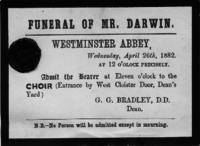
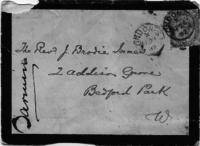
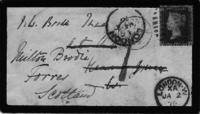
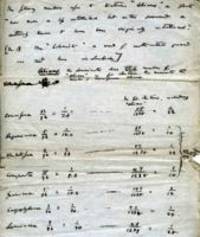
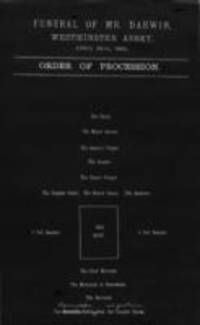
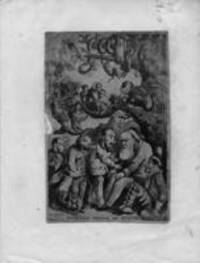
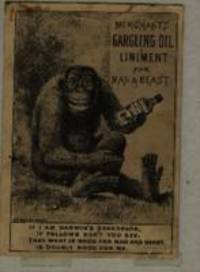
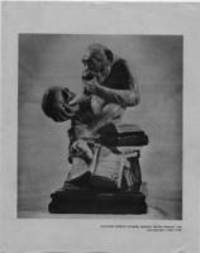
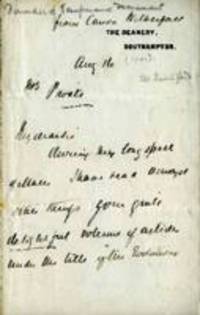
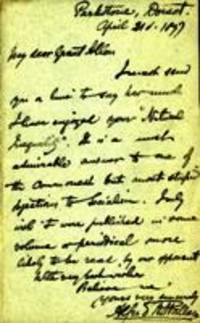
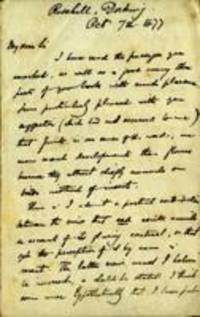
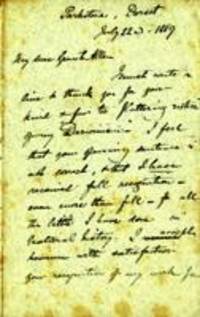
![Letter from Alfred Russel Wallace to [Grant Allen]](https://digital.case.edu/sites/default/files/styles/islandora_imagecache_image_style_medium/public/externals/aa789723e0d16e5c1523581774fcdbd6.jpg?itok=6UNPCBUP&pid=ksl:ditalldar00113&iic=true)
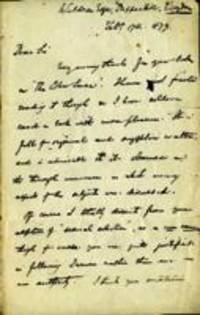
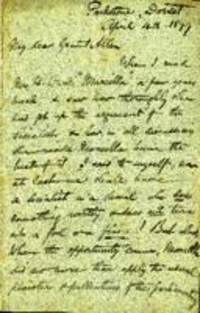
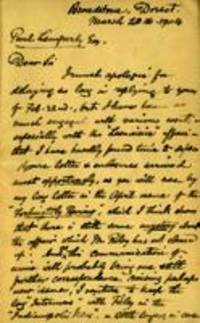
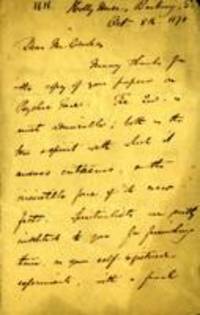
![Letter from Charles Darwin to [A. D. Barlett], 4768](https://digital.case.edu/sites/default/files/styles/islandora_imagecache_image_style_medium/public/externals/fb801b1628ea3fa2d4a2f84551ebf104.jpg?itok=swn0sokZ&pid=ksl:ditalldar00177&iic=true)
![Letter from Charles Darwin to A. H. Garrod [Alfred Henry Garrod], 9449](https://digital.case.edu/sites/default/files/styles/islandora_imagecache_image_style_medium/public/externals/0ec4a61dc000fea1e96022d6526f67c8.jpg?itok=u20BvtoQ&pid=ksl:ditalldar00190&iic=true)
![Letter from Charles Darwin to A. R. Wallace [Alfred Russel Wallace], 8677](https://digital.case.edu/sites/default/files/styles/islandora_imagecache_image_style_medium/public/externals/6a093d8358ea95d83b50abb03fa8e199.jpg?itok=olIA6P53&pid=ksl:ditalldar00199&iic=true)